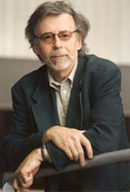DIGITAL MEDIA :
A STRATEGIC ISSUE FOR THE VERY FUTURE OF THE ARAB COUNTRIES
Opening allocution for the Conference
New Media and Change in the Arab World
February 27, 2002, Amman, Jordan
by Hervé Fischer,
Chairman of the International Federation of Multimedia Associations.
 I thank the organizers of the Conference, Mr Greigor Meiring of the Konrad Adenauer Stiftung and M.Ramzi Khoury for their kind invitation to be here with you today. I thank the organizers of the Conference, Mr Greigor Meiring of the Konrad Adenauer Stiftung and M.Ramzi Khoury for their kind invitation to be here with you today.
I shall try to introduce shortly the strategic issue of the digital media for the future of the Arab world, as seen from a western experience, with a personal deep conviction of the importance of the cultural and political diversity in our world. The Western countries have built their so called Information
Society on the base of traditional analogical media. And we have been happy with them. They have allowed us to develop cultures, democracies and economical prosperity based on a high level of freedom and creativity of expression.
But what we call today in the Western countries the New Media are in fact the digital media. And they are initiating a very important change in our civilisations. The New (Digital) Media must be considered as a huge challenge for all of us, also for the rich countries, not only because many of the information media will become soon totally digital (telephone, radio, television, cinema, etc.), but also because the production technologies of the cultural contents themselves are becoming digital. Not to speak from the spectacular explosion of the Internet and its alternative attraction.
The fast and powerful arrival of the digital media may result for the next future into a dangerous digital divide between, so to say, North and South civilisations, if we don't give special attention to this issue.
Samuel Huntington, an American intellectual, has become recently famous for his theory of the "shock of civilizations". September 11th events have comforted his dangerous thesis. I have myself recently published a book called the Digital Shock. But l rather believe in a shock between the rich countries, which are also the countries enjoying a high level of information and technological innovation, those two trends being closely linked in my point of view, and the poor countries, which have often sacrificed their spirit of innovation and freedom of expression in regards to a conservative interpretation of their cultures.
I am not a convinced believer in any so called human progress, which would be a moral progress; but we have to admit that the technological progress does exist, and that it always favours economical prosperity and freedom of expression. I am convinced that we are entering the Digital Age. This technological revolution will be profitable with the time for all cultures and civilisations, as the Age of fire or the Age of iron have been, regardless to the differences and specificities of identities and civilisations, which may all benefit of it, not only without deleting their own soul, but even supporting the development and diffusion of their differential cultures.
The International Federation of Multimedia Associations will therefore devote its next international Summit in October in Montreux to the Digital Divide, and you are all invited to attend. The director of the Federation, André G. Côté, will give you more information about the programme this week.
The question of media and new media is a question of political and economical power first, not a question of technology. And secondly it is a question cultural attitude and therefore of content's production. If you want alternatives to CNN, BBC, etc., you have to produce competitive and local contents. The main issue is not only to own or get access to the technological networks, satellites and cables; it is also and foremost to produce local contents of good quality to put into the tubes.
And because the digital media, such as Internet, are more flexible, they could be an alternative chance for the Arab world, offering new possibilities to promote its cultural and political diversities.
Allow me also to underline in my conclusion that the digital media will become soon even a competitor for analogical traditional media in the Arab World, because of their low price, flexibility and appropriation by the younger generations.
I don't believe in fatalities except the extension and increasing power of the digital technologies. I believe in innovation. Nobody has forgotten the time when the Arab civilisations have dominated the world, thanks to innovation in mathematics, science, technology and philosophy, being even as imperialist conqueror as other countries may be now a days. New technology - this is one of its paradoxes - favours intellectual innovation, economical growth, freedom of expression, and political power, including the power of developing your own culture and identity in the Arab World.
There is no reason for any ideological conflict between media, new medias, digital medias, and the Arab culture. On the contrary, the Arab World could now use these new tools to reassure its role in the globalization of the contemporary World and favour a better understanding and dialogue between West and Islam. Thank you for the opportunity to participate in this important conference, and I hope to meet you again in Montreux in October!
« retour
|